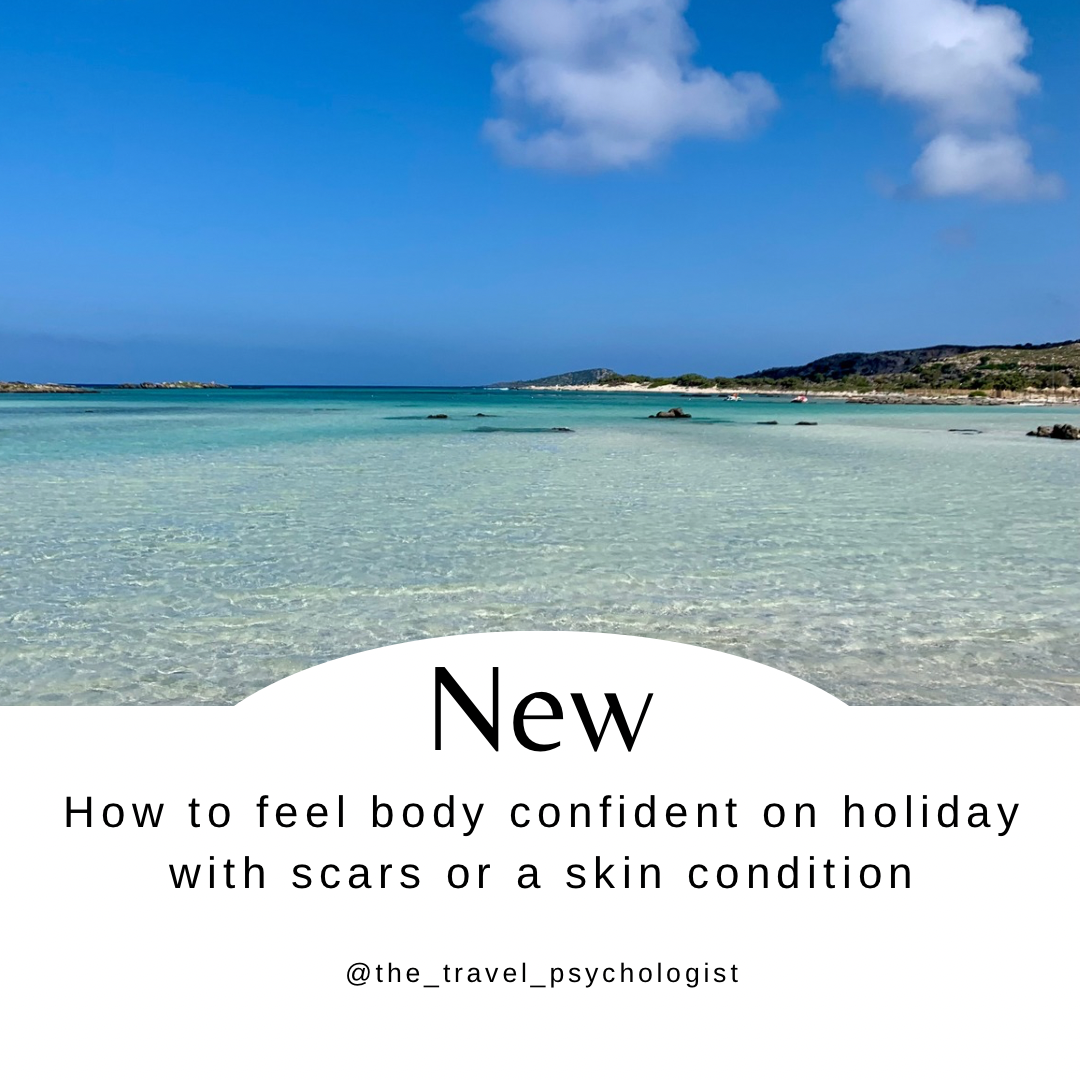Dr Charlotte Russell, Clinical Psychologist & Founder
Having scarring or a skin condition is relatively common. People vary considerably in how they feel about this, and allowing these areas of their body to be visible. For some people the prospect of holidays and warmer weather can bring up difficulties with body confidence and fears about having certain areas of their body on show. In this guide I’m going to talk you through how to manage these kinds of fears so that you can make the most of your break.
What kinds of challenges can holidays bring if you have scarring or a skin condition?
The summer season and holidays can bring up several challenges if you have scarring on a skin condition. The first is around deciding what to wear. Options in this season often include strappy tops and dresses, shorts, t-shirts and of course swimwear. You may find this challenging if you usually prefer to keep your skin covered.
Another challenge is expectations around holiday activities, and perhaps your travel companions wanting to spend time on a sun lounger or at the beach. This is not everyone’s ‘cup of tea’ whether you have a skin condition or not. If you do have a skin condition or scarring, or even fair skin, you may have been advised to stay out of the sun and to wear high SPF suncream or sunblock.
A third challenge is around potential comments or questions from others. Many people worry about this happening and how they might respond. This can be a challenge in our home country, but on holiday cultural differences can also be relevant.
How can scarring or skin conditions affect self-esteem?
Scarring and skin conditions can contribute to people feeling self-conscious, which can have a negative impact on their self-esteem. However, the research in this area indicates that the size or visibility of scarring is not always a good predictor of the impact on someone’s self-esteem and confidence. We tend to find that if someone already has difficulties with self-esteem or confidence, this can be exacerbated by skin conditions or scarring. There can be a vicious cycle here, where the impact of the skin condition then lowers self-esteem and confidence further.
The helpful message to take away here is that there are ways of coping that can help you reduce fears and worries about your appearance. You can feel body confident with scarring or a skin condition.
Indicators that scarring or skin conditions are affecting your self-esteem include avoidance of situations that you would otherwise want to be doing. This might be social situations or activities that you would otherwise enjoy. Not feeling confident in your appearance and hiding away under layers of clothing (that you don’t feel good in) can also be an indicator that your condition is impacting your self-esteem.
Self-critical thoughts are often an indicator of difficulties with self-esteem. For someone with scarring or a skin condition, this might show up as feeling critical about appearance. It might also include feeling ‘not good enough’ or ‘less than’ other people because of your condition or appearance.
How can I feel body confident while on holiday?
Notice and challenge unhelpful thinking
The first step to changing unhelpful thoughts is to begin to notice and challenge these kinds of thoughts. This is important because self-critical thoughts can masquerade as truths. A good example here is something like “my skin condition makes me unattractive”. This is so far from truth, because how we look and come across is so much more than the condition of our skin.
We tend to experience other people as a ‘whole’; how they dress, if they are kempt, how they hold themselves and if they seem confident etc. When someone has an aspect of themselves that they feel conscious about, their attention will tend to ‘zoom in’ on that part. This means they may overestimate how visible and obvious the area is, and how much other people will pay attention to it. Knowing all of this can help you to recognise how that your skin condition will not necessarily impact others’ impression of you.
When you have identified self-critical thoughts, it is time to come up with more helpful statements. In relation to your skin condition, this might be something like “my skin does not define me”. Also identify the aspects of your appearance that you do find positive, and also your strengths that are not appearance related.
If you find it difficult to manage self-critical thoughts, I would advise you to consider accessing therapy. A therapist will help you understand these difficulties and work with you on strategies to manage them and build your confidence and self-esteem.
Making the right clothing choices for you
When choosing clothes, the primary focus should always be to find clothes that you feel good in. People will vary as to whether they feel comfortable with their skin condition or condition visible or not, and there is no right or wrong. However I would advise against wearing clothing that doesn’t make you feel good or comfortable, or does not feel stylish for you, solely because it covers the area you are conscious about.
I want you to feel good about what you are wearing. The best outcome would be that you are able to find clothes that you feel good in and focus on what you can do to make the most of your appearance. In summer this may involve linen and cotton items that many clients have found helpful and comfortable in the warmer weather.
Accessories can be a great way to help these items fit your personal style and to make you feel good about what you are wearing and how you look.
I used to work in a burns unit and so I have worked with many clients with severe scarring. It really is the case that how you dress and style yourself, and how you carry yourself is so important. This matters so much more than how your skin looks.
Managing comments and questions from others
I always advise clients who have a visible condition to have some responses prepared ‘up their sleeve’ in case someone asks a question. It is unfortunate that this is necessary, but it is better to expect that this will happen and to be prepared, rather than to feel anxious and unprepared when you are out and about. These questions and comments often happen out of the blue and so can be difficult to respond to if you are not prepared.
Each person will vary as to what feels right for them in terms of how to respond. Some clients will say a firm “It’s none of your business” to any question for a stranger. If it seems like a ‘nosey’ question, this is often the appropriate response. If someone is staring, you may want to ask them “Can I help you?” or “Do I know you from somewhere?” to make them aware that you have noticed their attention.
When the question comes from someone you know or when it does not feel so intrusive, you may want to have a different kind of response prepared. This is helpful when the question seems to come from a place of concern. In this case I advise the ‘Explain, reassure, distract’ technique. As an example “I have a skin condition, and most of the time it’s under control and it’s nothing to worry about. Did you watch that series on Netflix that everyone’s talking about?”. This is a way to take control of how much you share and then to politely change the subject. By doing this you are giving the message that you have said as much as you wanted to.
These strategies can help you to take control of the situation. This can help with your confidence and how you feel about your condition, and yourself.
Managing differences in expectations
If you find that you and your travel companions have differences in expectations about your holiday, it is important to communicate this. For more on this, check out How do I get along with my friends on vacation? and Travelling together as a couple: advice from a psychologist
Conclusion
If you are self-conscious about scarring or a skin condition it is important not to let this stop you from travelling. Looking out for unhelpful thinking, preparing yourself for comments and questions and finding the right clothing for you are all important ways to prepare yourself for your trip. Over time with these strategies you can build your body confidence.
If you liked this article, check out How can I overcome body-consciousness on holiday?





